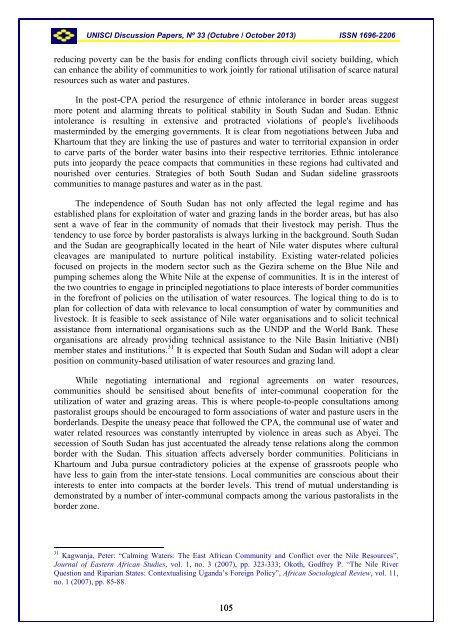UNISCI - Universidad Complutense de Madrid
UNISCI - Universidad Complutense de Madrid
UNISCI - Universidad Complutense de Madrid
You also want an ePaper? Increase the reach of your titles
YUMPU automatically turns print PDFs into web optimized ePapers that Google loves.
<strong>UNISCI</strong> Discussion Papers, Nº 33 (Octubre / October 2013) ISSN 1696-2206reducing poverty can be the basis for ending conflicts through civil society building, whichcan enhance the ability of communities to work jointly for rational utilisation of scarce naturalresources such as water and pastures.In the post-CPA period the resurgence of ethnic intolerance in bor<strong>de</strong>r areas suggestmore potent and alarming threats to political stability in South Sudan and Sudan. Ethnicintolerance is resulting in extensive and protracted violations of people's livelihoodsmastermin<strong>de</strong>d by the emerging governments. It is clear from negotiations between Juba andKhartoum that they are linking the use of pastures and water to territorial expansion in or<strong>de</strong>rto carve parts of the bor<strong>de</strong>r water basins into their respective territories. Ethnic intoleranceputs into jeopardy the peace compacts that communities in these regions had cultivated andnourished over centuries. Strategies of both South Sudan and Sudan si<strong>de</strong>line grassrootscommunities to manage pastures and water as in the past.The in<strong>de</strong>pen<strong>de</strong>nce of South Sudan has not only affected the legal regime and hasestablished plans for exploitation of water and grazing lands in the bor<strong>de</strong>r areas, but has alsosent a wave of fear in the community of nomads that their livestock may perish. Thus theten<strong>de</strong>ncy to use force by bor<strong>de</strong>r pastoralists is always lurking in the background. South Sudanand the Sudan are geographically located in the heart of Nile water disputes where culturalcleavages are manipulated to nurture political instability. Existing water-related policiesfocused on projects in the mo<strong>de</strong>rn sector such as the Gezira scheme on the Blue Nile andpumping schemes along the White Nile at the expense of communities. It is in the interest ofthe two countries to engage in principled negotiations to place interests of bor<strong>de</strong>r communitiesin the forefront of policies on the utilisation of water resources. The logical thing to do is toplan for collection of data with relevance to local consumption of water by communities andlivestock. It is feasible to seek assistance of Nile water organisations and to solicit technicalassistance from international organisations such as the UNDP and the World Bank. Theseorganisations are already providing technical assistance to the Nile Basin Initiative (NBI)member states and institutions. 31 It is expected that South Sudan and Sudan will adopt a clearposition on community-based utilisation of water resources and grazing land.While negotiating international and regional agreements on water resources,communities should be sensitised about benefits of inter-communal cooperation for theutilization of water and grazing areas. This is where people-to-people consultations amongpastoralist groups should be encouraged to form associations of water and pasture users in thebor<strong>de</strong>rlands. Despite the uneasy peace that followed the CPA, the communal use of water andwater related resources was constantly interrupted by violence in areas such as Abyei. Thesecession of South Sudan has just accentuated the already tense relations along the commonbor<strong>de</strong>r with the Sudan. This situation affects adversely bor<strong>de</strong>r communities. Politicians inKhartoum and Juba pursue contradictory policies at the expense of grassroots people whohave less to gain from the inter-state tensions. Local communities are conscious about theirinterests to enter into compacts at the bor<strong>de</strong>r levels. This trend of mutual un<strong>de</strong>rstanding is<strong>de</strong>monstrated by a number of inter-communal compacts among the various pastoralists in thebor<strong>de</strong>r zone.31 Kagwanja, Peter: “Calming Waters: The East African Community and Conflict over the Nile Resources”,Journal of Eastern African Studies, vol. 1, no. 3 (2007), pp. 323-333; Okoth, Godfrey P. “The Nile RiverQuestion and Riparian States: Contextualising Uganda’s Foreign Policy”, African Sociological Review, vol. 11,no. 1 (2007), pp. 85-88.105
















